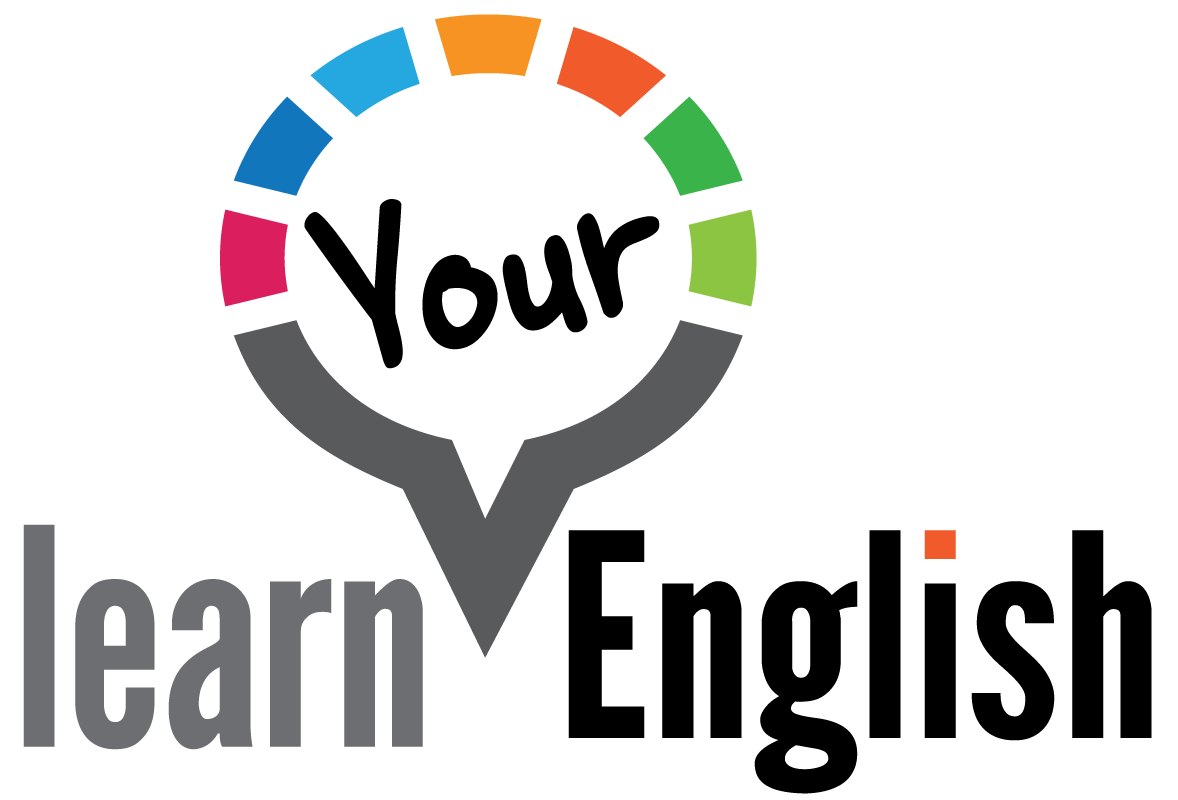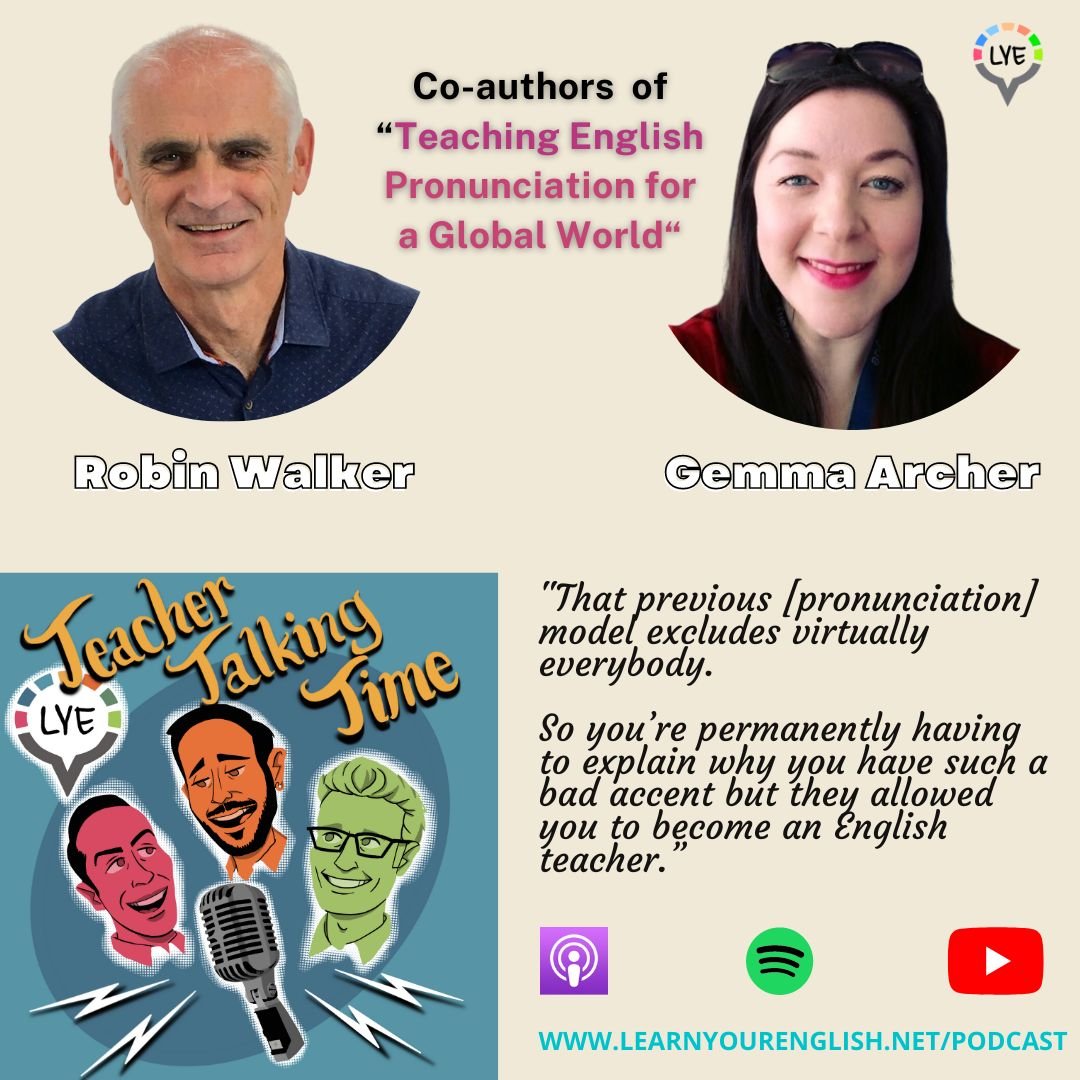The Teacher Talking Time Podcast
Or Watch the Video Versions on YouTube
Hosting your own course? Try Skool
Courses and community in the same place. We use Skool for our courses and love it.
Starting a Podcast? Try Podbean
We use Podbean every day for our own shows and can say how easy and effective it is.
EPISODES
Native English isn’t Relevant to the Majority of English Users - Jennifer Jenkins
"It's such social injustice to expect people to use English like native English speakers, whichever country they're in."
We dive into this and English as a Lingua Franca (ELF) with Jennifer Jenkins.
Jennifer Jenkins is a British linguist and academic. She was Chair Professor of Global Englishes at the University of Southampton until her retirement in 2019 and is a leading figure in the study of English as a Lingua Franca (ELF),
In this episode, Jennifer tackles:
what English as a Lingua Franca (ELF) is
native speakers vs local speakers
why she was shunned from many rooms for her views
the cultural and linguistic bias in language testing
how tests are not predictive of academic success
the myth that ELF lowers English standards
the role of adjusting language rather than mimicking it
having a pioneer mindset even when people dismiss you
how international universities have hypocritical linguistic standards
the future of English as a global language
Native Teachers Can’t Fix Pronunciation - John Levis
Learners can think a native teacher is a vaccine against poor pronunciation. Equally, native teachers can be misinformed in thinking that students should just follow them.
We dive into pronunciation, intelligibility, and teacher effects on learner performance with the great John Levis.
In our conversation, John talks about:
accent vs pronunciation
the nativeness principle vs the intelligibility principle
how he coined "the intelligibility principle"
high and low value features of pronunciation
why some vowel sounds don't matter
native and non-native teacher effects on learner performance
learners viewing native speakers as a vaccine for poor pronunciation
some native teachers believing learners should just follow them
getting "caught" with accent
Stop Apologizing for Being Multilingual - Dr. Angelica Galante
Native speaker or non-native speaker? Monolingual or plurilingual? Why do we have a binary bias in modern society?
These are some of the questions we tackled with Dr. Angelica Galante.
n our conversation, Dr. Galante talks about:
Linguistic and Cultural Discrimination
Strategies to Combat Prejudice in Education
Plurilingual and Pluricultural Competence
Navigating Binary Bias in Language Discussions
Exploring Common Ground in Controversial Topics
The Role of Language in Identity and Mental Health
Practical Applications of Plurilingualism in Education
Balancing Plurilingualism and Language Acquisition
Challenges and Facilitators of Plurilingualism
A PLAN is not a STRATEGY: The 7 Cs of Teacherpreneur Success
Why do some teachers thrive as entrepreneurs while others struggle? We dissect this question.
Many teachers want to earn more, teach online, and gain more clients - but struggle to implement a sustainable strategy. We go over seven "Cs" to help.
In this episode, we dive into the "seven Cs of success for teacher entrepreneurship" and discuss:
confidence as a skill rather than a feeling
getting granular on goals
strategizing goal achievement at both the macro and the micro
reflecting on why having a business is (or isn't) a priority
how consistency compounds over time
why getting more clients is nearly impossible if you have nothing to sell
normalizing struggle and self doubt
first steps to starting your business in 2025
We should AIM to give more STATUS to being a teacher - Audrey Rousse-Malpat
If you use vocabulary and grammar tests, you don't teach communicatively. Audrey Rousse-Malpat tells us why.
Audrey Rousse-Malpat is an assistant professor in second language acquisition at the University of Groningen in the Netherlands
In our conversation, Audrey talks about:
thinking like a scientist
schools as factories
AIM (Accelerative Integrated Method) and how it works
feeling like the Marry Poppins of error correction
structure-based teaching vs Dynamic usage
why teachers need to relinquish control
what went wrong with the communicative approach
tips for implementing AIM
multilingual approaches in higher education
Burnout and stress is TOO LATE for teacher wellbeing - Sarah Mercer
Education is designed around focusing on the learner first and the teacher as a medium to support the learner. Sarah Mercer tells us why this leads to unhealthy teachers.
Sarah Mercer is a Professor of foreign language teaching at the University of Graz, Austria.
In this episode, Sarah expounds on:
why connecting with learners is fundamental
cell phone addiction and what we CAN'T do about it
re-framing what "student-led" means
defining "engagement" and pedagogical caring
students faking engagement out of respect for their teacher
burnout and stress are the result of the systemic element of teacher well-being
The Communicative Approach is a DISASTER - Dr. Enrica Piccardo
ELT is full of disasters, including the destruction of the communicative approach. In this episode, Dr. Enrica Piccardo tells us why.
Dr. Piccardo is a Professor of Applied Linguistics and Language Education at the Ontario Institute for Studies in Education, University of Toronto. Her research spans language teaching approaches/curricula, multi/plurilingualism, creativity and complexity in language education.
In this episode, Dr. Piccardo discusses:
leveraging the messiness of learning
how Headway destroyed the communicative approach
multiple disasters in ELT: the separation of languages, the native speaker model, organization curriculum around grammar, and others
how we're still teaching in a grammatical way because it's easier
what mediation is, its role in learning, and its 3 types
updating the CEFR to include mediation
the link between mediation and plurilingualism
the action-oriented approach and its benefits
why teachers need to delegate learning
Teachers have TWO options: Earn more or leave ELT
What do toad venom, the 5 stages of grief, and precarity all have in common? Andrew, Leo, and Mike explain.
In this episode, we discuss strategies to earn more by creating your own offer. Specifically, we dive into:
the 5 stages of grief pertaining to precarity
two paths teachers have: stay in ELT or move on
why earning more money is a requisite to stay in the industry
how to create a compelling offer that will actually sell
why focusing on lesson frequency is restricting
not creating solutions to problems no one cares about
toad venom and how you can apply it to your teaching business
ELT has the WRONG input: Learners can't understand REAL people - Sheila Thorn
ELT provides the wrong input: language as it should be spoken not as it is spoken. This is wrong and Sheila Thorn gives us another way. Sheila is a renowned teacher, trainer, and materials writer. She also founded The Listening Business in 1998.
In this episode, Sheila discusses:
ELT having the wrong input
coursebooks as impoverished language
learners being scared of real language
how teacher training fails teachers as much as coursebooks fail students
the 5 listening goals every learner should have
a 3-pronged approach to teaching listening
the problem she is trying to solve in ELT
Grammar is in the BRAIN, not on a piece of paper - Tania Ionin & Silvina Montrul
Grammar instruction or grammar learning? We dive into this with today's guests, Silvina Montrul and Tania Ionin.
In this episode, they discuss:
grammatical knowledge in the context of language acquisition
what intervention research is
why we expect too much of adult learners
how instruction contributes or doesn't contribute to grammar acquisition
efficacious conditions for grammar instruction
how educators can influence the learning of grammar
why studying monolinguals helps to understand L2 acquisition
literate vs illiterate native speakers for a study on grammatical knowledge
We CANNOT and DO NOT Control What Students Learn - Bill VanPatten
So many teachers focus on teaching when they should focus on something else. In this episode, we dive into this with the great Bill VanPatten. Bill VanPatten is an award-winning scholar and teacher with an international reputation in the fields of second language acquisition and second language teaching.
We chat with Bill about why:
the majority of teaching is not in accordance with SLA research
Krashen was right
Krashen's theories are not used in language education
teachers need to get rid of the "Atlas Complex"
most people don't understand what a communicative classroom means
grammar rules are not psychologically real
many researchers don't want to talk to teachers
understanding how non-college educated L1 speakers process language shows explicit instruction's ineffectiveness
if learners can do your assignments using AI, the assignment is flawed
The traditional pronunciation model EXCLUDES virtually every teacher - Robin Walker & Gemma Archer
So many teachers feel they can't teach pronunciation if their speech doesn't sound a certain way. Listen to this episode to discover why that isn't true.
Robin Walker and Gemma Archer are pronunciation specialists who co-authored "Teaching English Pronunciation for a Global World," which aims to encourage pronunciation instruction from a lingua franca and intelligibility perspective.
We chat with Robin & Gemma about:
intelligibility, comprehensibility, and accentedness
why the Lingua Franca Core is what teachers should learn
their disdain for Jennifer Jenkins' criticism of them - before realizing she was right
how intelligibility is the thing that allows pronunciation to do its job
weak forms and why they're not necessary for intelligibility
why the goal of international intelligibility doesn't exclude other goals
how to measure intelligibility & use Linca Franca Core diagnostics with your students
TBLT isn't a fad & this is why NOT using it is holding you back - Lara Bryfonski
Lara Bryfonski is an applied linguist and assistant professor of linguistics at Georgetown University. She recently co-authored the book The Art and Science of Language Teaching with Alison Mackey.
In this episode, Lara dives into:
if "TBLT" is a fad
the myth that novice teachers can't handle TBLT
why experienced teachers are often the most resistant to try it
using a TBL approach within a strict syllabus
where grammar instruction fits into a TBL approach
what a task is and isn't
navigating a learner's internal syllabus
task design and how to apply it in your courses tomorrow
Twitch, gaming, and asynchronous TBLT
her advice for aspiring TBLT practitioners
Donna Brinton on Content-based Instruction (CBI)
Donna M. Brinton is a methodologist, trainer, author, and distinguished figure in applied linguistics. A key aspect of Donna's work is her advocacy for Content-Based Instruction (CBI).
In this conversation, Donna expounds on:
her beginnings as a teacher & her struggles with methodology
why she decided to focus on methods as a point of emphasis
content-based instruction and how it impacts language learning
developing and using a CBI syllabus
the 6 "t's" framework & the 3 CBI prototypes
CBI case studies around the world
the problem with minimal pairs and what can be done instead
the future of methodology & teacher development
2023 Wrapped: Making Next Year an Authentic One
Leo, Mike, and Andrew grab some nog, get in the holiday spirit, and chat about authenticity - Merriam-Webster's word of the year for 2023. We delve into what the word means to us and how we and anyone building a business can bring as much authenticity as possible into 2024.
Specifically, we dive into:
our process and struggles with niching down
why the response "teachers will love that" to our first offer was a bad answer
the "do one thing" philosophy to business growth
how you can develop sustainable practices in your business in 2024
Cecilia Nobre on Using Video for Teacher Development
Cecilia Nobre is a PhD candidate, teacher, trainer, and author. She has been an EFL teacher for over 20 years, and is a trainer on DipTESOL, CertTESOL, and Celta trainer. She recently co-authored the book "Using Video to Support Teacher Reflection and Development in ELT" with Steve Mann and Laura Baecher.
In this episode, Cecilia touches on:
video-based observation as a form of development
how videos can foster more critical reflection
using video recordings in both the physical and digital classroom
why every teacher should record their own lessons - and then watch them
how video observation can be incorporated into pre-service training courses
why video observation reduces the hierarchical relationship of traditional observation and how it can foster community building
advice for new educators just getting started
Geoff Jordan on ELT Now and How It Could Be
Geoff Jordan is a teacher, trainer, academic, and author. Geoff has a Ph.D. in Second Language Acquisition, has worked at ESADE, Barcelona for 28 years, and recently co-authored a book with the late Mike Long called "ELT Now and How It Could Be."His main academic interests are: theories of SLA, psycholinguistics, teaching practice and computational linguistics.
Specifically, Geoff touches on:
his beginnings in the ELT industry
working alongside Mike Long, Peter Skehan and Henry Widdowson in the early days
his new book "ELT Now and How It Could Be," co-written with the late Mike Long
how commercialization has hurt the language industry
why students should be angry after 300 hours of study when they still can't "go to the pub in London"
why task-based learning is the only way to go
why "presenting" language is inefficacious
how the future of the industry is in niche courses
advising students to be more resourceful in their learning
listener questions
Paul Nation on How Languages are Learned
Paul Nation is an Emeritus Professor of Applied Linguistics and renowned researcher and author in our industry. He joins us for a discussion on learning, putting research into practice, and - of course - the four strands 27 years later.
Paul touches specifically on:
his vocabulary niche
the birth of the four strands
how it's a basis for course construction, not lesson design
how he learned Greek on a 2 hour flight
why teachers who do extensive reading are brave
why teachers need to believe that by not teaching, people can learn
the only 3 things that matter in learning
if there is a fifth strand
Dogme Days of Summer
Andrew, Mike, and Leo sit down and ponder Dogme....as a new approach? It certainly has experienced a resurgence since the pandemic and we are curious why that is.
We also dive into:
the role of the teacher
the shift away from planning & towards reacting
what authentic communication actually means
how teachers can model lifelong learning habits
using Dogme in your business and using the less is more philosophy
Dylan Gates on Dogme and the RDS Method
Dylan was born just outside London and has been working in the ELT sector for nearly 25 years. About 12 years ago, he discovered Dogme, or as he prefers to call it “Teaching Unplugged.”
In this episode, he shines a light on:
how freelancing led him to Dogme
why he includes reactive teaching in his tool kit for the modern teacher
the RDS method for dealing with emergent language
key considerations for designing materials with a reactive mindset
the future of ELT, AI, and how teachers can innovate




















Subscribe to the Show
Teaching Talking Time is an English Language podcast aimed at teaching professionals and learners. Leo, Mike, and Andrew bring you discussions, interviews, and debates on English language training and learning. From approaches, misconceptions, and successful and failed case studies, each episode is dedicated to their vision: continual growth. They interview teachers and learners from around the world, and also debate the merits of common teaching approaches.
We release two episodes a month: one for teachers and one for students.